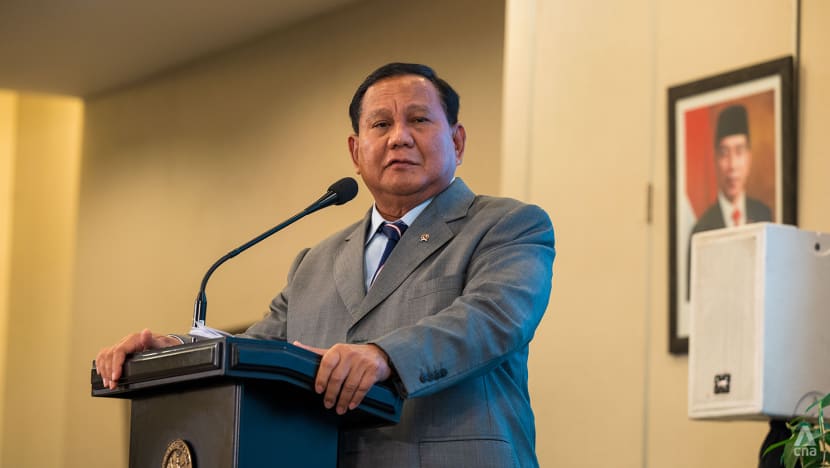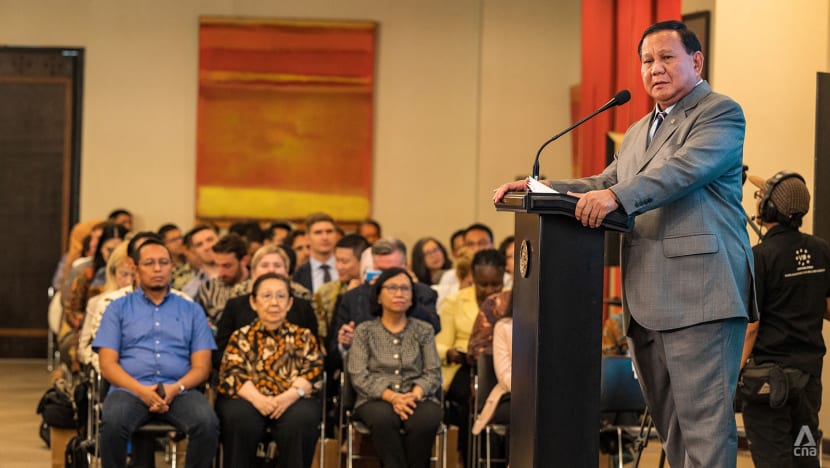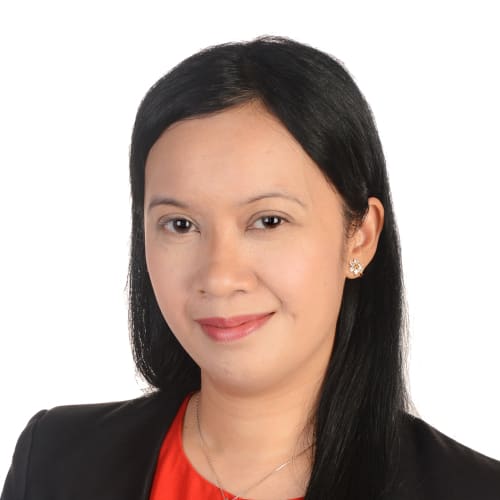Analysis: Indonesian presidential frontrunner Prabowo strikes China-friendly tone, but knows Jakarta still needs Washington
Mr Prabowo Subianto spoke about emulating China in poverty reduction and other ways at a forum this week. He may be keen to engage more with Beijing, but will face limitations in leaning away from the US, analysts say.

Presidential candidate Prabowo Subianto at the Centre for Strategic and International Studies event on Nov 13 2023. (Photo: Danang Wisanggeni/ CNA)

This audio is generated by an AI tool.
JAKARTA: Presidential frontrunner Prabowo Subianto struck a China-friendly tone at a forum this week, even as he affirmed Indonesia would remain non-aligned in its foreign policy and not join any power blocs should he win next year’s election.
Speaking on foreign policy at an event organised by the think tank Centre for Strategic and International Studies (CSIS) on Monday (Nov 13), Mr Prabowo acknowledged China's success in eradicating poverty in just a few decades.
Indonesia has always looked to the West for its many successes, he said.
But given China’s achievements, Indonesia could also emulate the East Asian country, he said.
“Some, we can emulate – maybe their commitment against corruption, their focus on education, their strong discipline, their strong national pride. These we admire,” the 72-year-old presidential candidate, who is Defence Minister, told an audience of diplomats, academics and journalists.
“I do admire and acknowledge the success of the Chinese leaders in nearly eradicating poverty. The Chinese leaders achieved something very rare in human history.
“They lifted 700 million people out of poverty in one generation, in 40 years. That is a real achievement,” he said.
“But it does not mean that we can copy their methods. Maybe their methods are not in tune with our culture. So, we have to adjust,” he noted.
Mr Prabowo was the third presidential candidate to outline his foreign policy at CSIS forums in the past week, after rivals Mr Ganjar Pranowo and Mr Anies Baswedan spoke last week.
Indonesians will head to the polls on Feb 14 next year, and candidates will begin campaigning on Nov 28.
KEEN TO ENGAGE MORE WITH CHINA?
Dr Lina Alexandra, an international relations expert from CSIS, noted how Mr Prabowo showed his openness to working with China.
“From my observation, he is keen to engage more with China. I think that is very clear,” she told CNA.
“I think attracting (Chinese) investments will probably still be his priority,” said Dr Lina. Such a stance mirrors incumbent Joko Widodo’s, which observers have noted is geared towards serving the national interest and attracting investment.
Mr Prabowo did not reveal concrete plans on Monday, and analysts note he will face limitations in leaning away from Washington towards Beijing, which is already Indonesia’s biggest trading partner.
This is because the US is still a major partner for Indonesia, especially in defence.
As a former general, Mr Prabowo “is also very keen, from the military perspective, to get more benefits from the US, in terms of supplies”, said Dr Lina. “I don’t think he wants to get that from China.”
Indonesia and China have overlapping claims over the waters north of Indonesia’s Natuna Islands. The area is part of Indonesia’s exclusive economic zone but overlaps with China’s claim over most of the South China Sea.

US IS ‘STILL IMPORTANT’
Mr Prabowo is aware that Jakarta still needs Washington, Dr Lina noted.
In fact, hours following his CSIS speech in Jakarta, President Widodo met with his US counterpart Joe Biden in Washington, where both sides agreed to strengthen defence cooperation.
They intend to sign a new defence cooperation arrangement in cyber, military medicine, space, and combined exercises, among other areas.
Indonesia and the US also elevated their relationship to a comprehensive strategic partnership.
Given this, Mr Prabowo is unlikely to change Indonesia’s foreign policy significantly even though he may attempt to be friendlier towards China, said international relations expert Asra Virgianita from the University of Indonesia.
“I’m sure Prabowo knows the US is still important. It is… still number one. So, he won’t leave it behind if he gets elected.
“Many defence cooperations with the US have been established during his time (as defence minister),” said Associate Professor Asra. Both countries held a joint maritime exercise called Cooperation Afloat Readiness and Training (CARAT) in December last year, for instance.
On Monday, Mr Prabowo also spoke about Indonesia's long relationship with “the great powers of the world” such as the West, China, India and Russia.
Stressing the need for the “best relations” with all partners and countries, he added: “One thousand friends are too few, one enemy is too many.”
However, he did not mention future cooperation with the US at the event.
This, said Dr Lina from CSIS, could be strategy on the part of candidates as election season looms.
As the world’s biggest Muslim-majority country, Indonesia supports the Palestinian struggle for an independent state and condemns Israel’s attacks on Gaza.
Meanwhile, the US is a close ally of Israel.
Mr Prabowo may not want to be associated with the US at the moment, surmised Dr Lina.
PRABOWO’S FOREIGN POLICY ‘STILL UNCLEAR’
Compared to his fellow candidates’ CSIS speeches, however, Mr Prabowo’s foreign policy is still unclear, said analysts.
“Mr Prabowo did not mention anything on how to promote Indonesia’s sovereignty and tradition of non-aligned foreign policy,” said Associate Professor Dinna Prapto Raharja, executive director of the Jakarta-based think tank Synergy Policies.
“It is surprising, given he’s the minister of defence, (that) he used no data to raise his points.”
Mr Ganjar’s vision was largely similar to Mr Widodo’s. The former Central Java governor said guarding the archipelago’s maritime sovereignty would be among his top priorities, and also wanted to increase the power of the Indonesian passport.
Mr Anies, a former Jakarta governor, criticised Indonesia’s current foreign policy as being too transactional. “We need to participate actively in global forums and humanitarian efforts without asking what's in it for us,” he had said.
Read this story in Bahasa Indonesia here.


















